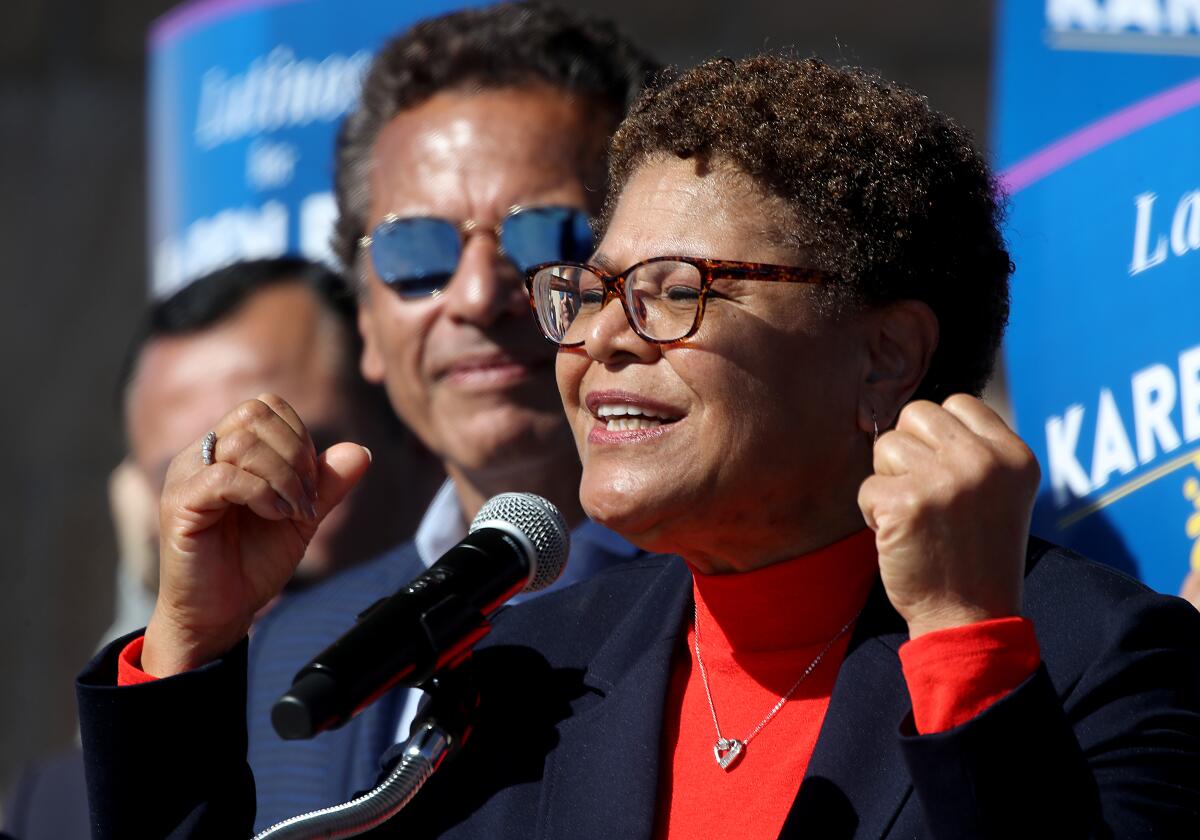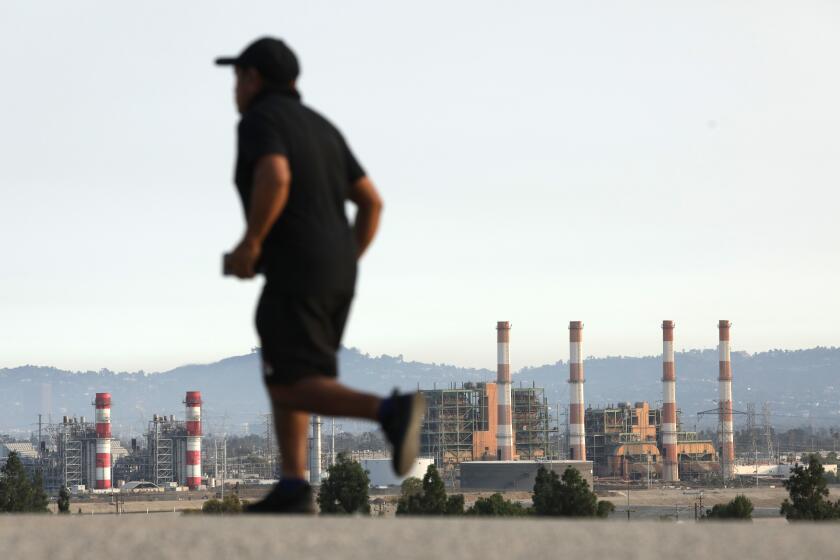Endorsement: Karen Bass for Los Angeles mayor

- Share via
These are pessimistic days in Los Angeles. In focus groups, surveys and polls, the same themes keep surfacing: Residents are angry and frustrated by the continued human suffering of the homelessness crisis. They’re dissatisfied with their quality of life. They’re worried about having money to pay their rent or mortgage, more fearful of rising crime and feeling the pinch of inflation and rising gas prices.
In a climate of fear and discontent, politics can turn ugly. Opportunistic politicians pander to people’s emotions, offering themselves as the strongman to bring order. Others offer simplistic solutions that might make the problems less visible or provide some temporary relief but don’t address the underlying conditions.
We’ve been here before.
Faced with a dramatic rise in homelessness in the 1980s, L.A. leaders responded with cots, tent cities, trailers and ultimately the criminalization of the homeless rather than enough affordable homes and services to help keep the vulnerable housed. The crack epidemic of the 1980s was met with the militarization of policing and mass incarceration, rather than a public health response to addiction.
Here are the L.A. Times’ editorial board endorsements for elected offices in Los Angeles city and county, LAUSD, superior court, statewide offices, the state legislature and U.S. House and Senate seats.
We’d like to think that Los Angeles has recognized the mistakes of the past. Voters have voted to tax themselves to pay for homeless housing and services, and have embraced criminal justice reforms designed to rehabilitate rather than just incarcerate. And yet, the public mood can shift quickly when anger, fear and frustration set in, which is why the candidates for mayor are again talking about temporary tent cities and trailers and enlarging the Police Department.
That’s why voters are fortunate to have an extraordinarily qualified, battle-tested, mission-driven leader on the ballot. The Times recommends Karen Bass for L.A.’s next mayor.

Congressmember Karen Bass would develop a new vision of community safety in L.A.
Bass brings nearly two decades of governing experience, including helping lead the state through extremely difficult times as the Assembly speaker during the Great Recession and state budget crisis. She has a reputation as a thoughtful, pragmatic, collaborative leader who never loses focus on the core reasons she entered public service — ensuring that no segment of society falls through the cracks.
As a physician’s assistant working in the emergency room, Bass saw how homelessness, substance abuse, untreated mental illnesses and violence were upending people’s lives. As the crack epidemic and crime ravaged South Los Angeles, she formed the Community Coalition to press leaders to address the deeper health, social and economic problems fueling the crime and upheaval. After the 1992 uprising, the coalition organized neighborhoods to close problem liquor stores, clean up nuisance properties that were magnets for crime and advocate for equal city services.
Congressmember Karen Bass spoke about her approach to the city’s homelessness crisis and how she would develop a new vision of community safety in L.A.
That community-informed activism helps explain why Bass, as a congresswoman, has rejected calls to “defund the police,” why she helped draft the George Floyd Justice in Policing Act that would have directed millions of dollars toward reforming police practices, and why she now proposes maintaining the size of the LAPD force while also investing in crime prevention programs. This approach may antagonize those who want to cut the number of police officers, but Bass told the editorial board, “You can have safety and justice at the same time.”
Bass was a respected activist in the city and recruited to run for the state Assembly in 2004. She won and spent her first few years focused on reforming the state’s foster care system and ensuring equality in school funding. In 2008, her colleagues elected her to be Assembly speaker, just as the Great Recession hit and California was about to plummet into financial chaos.
Bass went to Sacramento on a mission to knit a stronger safety net for the most vulnerable, and she found herself in the position of cutting social, health and education programs to save the state from financial ruin. Over two years, Bass and other legislative leaders negotiated with Gov. Arnold Schwarzenegger on a package of tax increases and spending cuts, with Bass facing protests from her activist allies for slashing services. She and three other legislative leaders, a fellow Democrat and two Republicans, received the John F. Kennedy Profile in Courage Award in 2010 for putting politics and ideology aside to compromise for the greater good of the state.
The Times editorial board interviewed several of the candidates for Los Angeles mayor leading up to the June 7 primary.
Elected to Congress in 2010, Bass again turned her attention to the most vulnerable. She formed the bipartisan Congressional Caucus on Foster Youth to promote the welfare of children in foster care. (Roughly 25% of youths aging out of the foster care system end up homeless within four years.) Her tireless work led to the passage of the Family First Prevention Services Act of 2018, the most significant child welfare policy reform in decades. And yet, Bass wasn’t listed as the author of the law. Why? To get it signed by President Trump, the bill had a Republican author and was tucked into a massive spending bill.
That commitment to building consensus and the willingness to sacrifice credit for results could be instrumental for the next mayor. The city, for example, cannot ease the homelessness crisis itself. Los Angeles County is an essential partner in providing mental health and substance abuse treatment. State funding is critical to help build or buy properties to convert into housing. The federal government could be a game changer if more money flowed for housing vouchers and basic income assistance. The point is, no mayor can do it alone, and that applies whether the problem is housing affordability, rising crime or fighting climate change or income inequality.
Contrast that with billionaire developer Rick Caruso, who is neck-and-neck with Bass in recent polls. His ubiquitous ads suggest he alone can solve homelessness, cut crime or eliminate public corruption. He says he will “demand” assistance from the governor, Legislature and federal government to fund shelters and homeless services, and he’ll make it “mandatory” for the independent city attorney to prosecute low-level crimes.
L.A. is already suffering from the impact of climate change, but candidates for mayor don’t seem to have many new ideas for what to do about it.
Surely, Caruso knows better — he’s no City Hall neophyte. He’s served on the commissions overseeing the Department of Water and Power and the Los Angeles Police Department. He knows that L.A.’s mayor has limited powers and relies heavily on the cooperation of the City Council, along with county and state government, to make transformational change.
Among the other candidates in the race, the editorial board has strongly supported both City Councilman Kevin de León and City Atty. Mike Feuer in their previous elections. For good reason.
As state Senate leader, De León had a big impact by developing ambitious solutions to major problems, then building alliances and using his political savvy to get them adopted. As a City Council member since 2020, he’s also pursued big plans to address homelessness — by overhauling the permitting process and building 25,000 housing units by 2025 — though it’s too early to gauge his success.
Through his career as a council member, state legislator and now city attorney, Feuer has been a creative, common-sense problem solver, whether trying to address gun violence, consumer fraud or housing affordability. But the fallout from the Department of Water and Power billing scandal, including the federal corruption charges against one of Feuer’s top assistants and an outside attorney, has put a cloud over his office.
It’s disappointing that Councilmember and former LAPD Officer Joe Buscaino has decided to position himself as the hard-on-homelessness candidate for mayor. He understands the complexities and challenges of solving the homeless and housing crisis but has resorted to stunts and tough talk.
Among the other candidates on the ballot, Mel Wilson, a real estate agent, Ramit Varma, a tech entrepreneur, and Gina Viola, a community organizer, bring some creative ideas to the table, but Los Angeles needs a more experienced leader.
For this race and this moment, no other candidate can match Bass’ experience, track record, sophisticated grasp of the problems plaguing Los Angeles and her vision of how to move forward.
More to Read
A cure for the common opinion
Get thought-provoking perspectives with our weekly newsletter.
You may occasionally receive promotional content from the Los Angeles Times.














